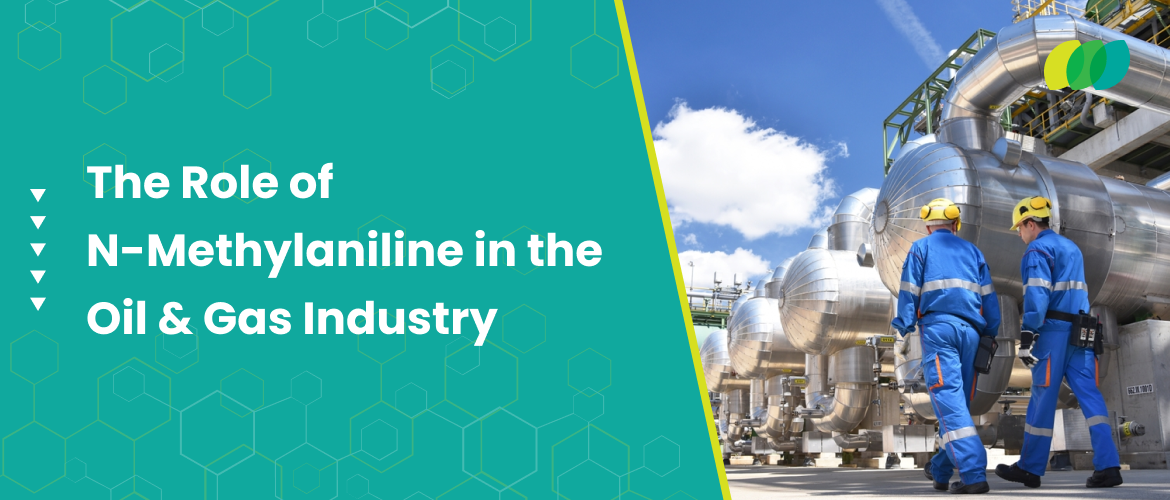N-methylaniline is a compound that is used a lot in the oil & gas industry. It has a big role in enhancing fuel performance, stabilizing crude oil, and making the refining process better. It is a very versatile additive and plays an important role in fuel octane enhancement, corrosion inhibition, and refining applications.
You still may think, what makes N-Methylaniline or NMA so indispensable? Whether it is boosting fuel octane levels or preventing corrosion, it has a lot of applications.
Understanding N-Methylaniline
N-methylaniline is derived from aniline through a methylation process. The chemical formula of N-Methylaniline is C7H9N, it looks like a yellow liquid. Due to its unique chemical properties, N-Methylaniline has applications in various industries, with a major role in the oil and gas industry.
Key Properties of N-Methylaniline
| Property | Value |
| Chemical Formula | C₆H₅NHCH₃ |
| Appearance | Clear to yellow liquid |
| Solubility | Slightly soluble in water, highly soluble in organic solvents |
| Boiling Point | ~196°C |
| Density | ~0.99 g/cm³ |
Applications of N-Methylaniline in the Oil & Gas Industry
1. Octane Booster in Fuels
One of the major uses of N-Methylaniline is as an octane booster in gasoline. It improves the anti-knock properties of fuel which results in a reduction in engine knocking and improving performance. Exporters of N-methylaniline supply this additive to refineries and fuel manufacturers that want an efficient alternative to lead-based additives.
2. Anti-Knock Agent
Engine Knocking happens due to premature combustion of fuel. This is inefficient and damages the engine. Suppliers of N-Methylaniline deliver these compounds as anti-knock agents to assist refineries in crafting high-grade fuels, including aviation and racing fuels.
3. Corrosion Inhibitors in Refineries
The refinement process along with oil transportation operations face corrosion as a primary operational concern. N-Methylaniline is used in the production of corrosion inhibitors to protect pipelines, tanks, and equipment from acid range.
4. Fuel and Crude Oil Stabilization
Crude oil alongside other fuels slowly deteriorates because of oxidation-related processes. N-methylaniline suppliers serve refineries with this chemical compound to function as a stabilizing agent. This prevents gum formation and extends fuel shelf existence.
5. Petrochemical Intermediary
Besides the fuel use, N-Methylaniline is used by manufacturers as a starting material for making dyes, drugs, and agrochemical products.
Benefits of Using N-Methylaniline in Oil & Gas Industry
- Increased Fuel Efficiency: Boosts combustive efficiency and octane rating.
- Reduced wear of machines: N-methylaniline acts as a knock-prevention agent to minimize machine wear during operation.
- Corrosion Prevention: It aids in keeping the equipment in the refinery in good condition.
- Increased Fuel Stability: Inhibits oxidation and after-effects resulting from it.
Challenges and Safety Considerations
All people should prioritize handling safety measures because N-Methylaniline offers many advantages to users. For safe N-Methylaniline handling one needs multiple layers of protective protocols and equipment together with storage that adheres to regulations.
Key Safety Measures
- Keep away from heat and points of ignition and store in a well-ventilated room.
- The rules for environmentally safe disposal must be remembered strictly.
- The necessary protective equipment must be used to shield yourself from dangerous substances during the work process.
Conclusion
At last, we would say that N-Methylaniline plays an important role in improving fuel performance in the oil and gas industry, reducing the engine’s banks and refinery that protects infrastructure.
N-methylaniline will see continuously rising importance because industry leaders actively pursue cleaner efficient fuel formulations. The suppliers of N-Methylaniline will maintain significant importance in developing new solutions because of ongoing improvements in fuel technology that address evolving energy sector requirements.

